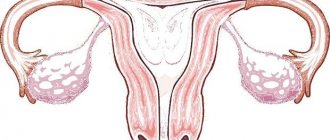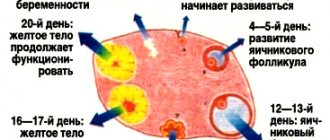The reasons and problems present when a woman farts in the vagina are no different from the factors that provoke similar sounds in other hollow organs communicating with the external environment.
Air is less likely to enter the female vagina than into the mouth from the surrounding area, or into the anus from the intestines.
But in the anus there is a special sphincter to control gas emission, and in a healthy state a person is able to regulate its activity.
Air leaves the anus after the appropriate command from the brain to relax the muscles.
When the vagina farts, the same process of air separation occurs, but the sphincter in this organ is not provided by nature.
Therefore, the air comes out spontaneously, and the woman cannot control this process. She is able to control the muscles of the vagina (after some training), but there is no sphincter at the exit, which means she has nothing to control.
Causes of vaginal farting
In order to understand where the air in the vagina comes from, let's talk a little about the physiological characteristics of this organ. If we compare it with the anus, the gases coming out of it are formed directly in the human body. These gases are produced by chemical reactions and are flammable. You can find out more information about this in the article - why people fart. But no gases are formed in the vagina. When you fart with your vagina, you fart with ordinary air; it has no smell, but only makes a characteristic sound when it comes out. Air enters the vagina from outside, over time it accumulates there and comes out, thus producing a fart.
Next, we will look at the three main reasons for air entering a woman’s vagina:
- During sex
- In everyday life
- Due to illness
Girl farts during sex
It happens that during sex a girl farts in her vagina. This can happen both during sex and after it. This is a fairly common phenomenon. Everything is very simple here, let's look at this fact from the point of view of physics. Imagine that the vagina is a cylinder and the penis is a piston. As a result of back-and-forth movements, the piston forces air into the vagina and, when there is an excess of it, it begins to come out. This does not always happen and not in all poses. If the piston comes out completely from the vagina, this will increase the air flow and is almost guaranteed to lead to a fart. If the partner's penis is too small compared to the woman's vagina or short, this also leads to increased air flow into the vagina during sex.
Some women have a very strong complex about this and are ashamed of it, which in turn prevents them from having a full sex life. Dear ladies, there is nothing scary or shameful about this, it’s just physics. It `s naturally. You shouldn't be ashamed of it. Women of all ages can fart with their vagina during sex. In older women and women who have given birth, this may also be due to weakening of the genital muscles.
It should also be noted that inexperienced men may misunderstand what is happening. Some people find this disgusting because they don’t understand that it’s just air that they themselves put in there. This only indicates his inexperience and nothing more.
Woman farts with vagina
Women can fart with their vagina not only during sex, but also in everyday life. This phenomenon rarely occurs in young people; older women are more susceptible to this. With age and after childbirth, a woman's genital muscles may weaken, resulting in air intake during movement. When air accumulates in a woman’s genital organ, it rushes out, making a characteristic sound. It is not possible to hold it, since, unlike the anus, the vagina does not have a sphincter.
The sound of a farting vagina can catch a woman at the most inopportune moment and put her in an awkward situation. As mentioned above, such a fart has no smell; it is not gases, but just air.
In principle, there is nothing wrong with this, but something needs to be done. But you can’t let the situation go, as this can lead to quite serious consequences. Atrophic muscles of the vagina and pelvis can lead to problems such as uterine prolapse.
Nature of the problem
Vaginal farting is a characteristic, but not particularly common, phenomenon that can cause significant problems not only in intimate life, but also in the emotional sphere.
The vagina (or vagina) is a hollow tube provided by nature, one end resting on the uterus and the other on the vulva.
The size of the organ depends on the individual characteristics of the body, the presence or absence of the birth process, and sexual activity.
It can stretch and contract with certain activities or stimulation. A woman, after some training, can control the muscles of the hollow tube, and during childbirth it increases further.
According to some studies, the size of the vagina changes slightly, but the vagina can spontaneously expand during sex.
A common misconception is that air enters a tube-shaped organ only in the presence of a certain pathology.
A fistula formed in the area between the large intestine and the vagina occurs for various reasons.
Air can enter the vagina during sex, exercise, and exertion for variable physiological reasons, resulting in sounds heard any time air escapes.
The answer to the question why this happens may take more than a dozen points in a detailed list. The intensity of the sound depends on the amount of air and the condition of the organ.
The time of sexual intercourse is not the only time when the vagina farts, the amount of air simply increases due to the frictions produced and the expansion of the tube to accomplish them.
And the familiar intimate setting makes them especially audible. Vaginal flatulence is characterized by the time of urination; it usually occurs during sex, but sometimes such sounds can also occur in unusual situations that are difficult to foresee.
The ways to resolve the existing problem, in any case, lie through diagnostics, which will help identify the etiology of the unpleasant problem.
How to deal with vaginal flatulence?
We have already found out above that if a woman farts with her vagina, this may indicate weakened pelvic muscles and genital muscles. So what to do in such a situation? Suck it up and call yourself an old fart? No matter how it is, we do not agree to this. Everything is much simpler, you need to do physical exercise. It will always benefit us. We need to tone and train the vaginal muscles.
How to do it? - very simple. There are a couple of simple ways to strengthen your sex muscles.
- When you go to pee, while urinating, try to interrupt this process several times by tensing your muscles. Carry out this procedure regularly and over time your muscles will become toned.
- Another fairly good and simple exercise is to hold an object between your thighs and walk. Everything is very simple. It is enough to devote a few minutes a day to this exercise and your muscles will again become elastic, strong and healthy.
To enhance the effect, we advise you to combine these exercises and not limit yourself to just one. When you bring your muscles into the desired shape, you should not stop exercising, they will only be beneficial.
As you can see, there are many reasons why air may enter the vagina, causing it to fart spontaneously. In most cases, this is not a cause for concern, but a call to exercise. We hope everything will be fine with you and the farting vagina will not bother you. This is where we say goodbye to you, but know that we are always happy to see you on the pages of our website. You are always welcome. Relief!
When a woman experiences air coming out of her vagina during sex or during tension, she gets a complex. The release of air is accompanied by a characteristic noise, which - even if there is no smell - brings a smile to the one who happens to be nearby. For an inexperienced sexual partner, such an incident may even cause disgust.
Useful video
Author: Ekaterina Sibileva, last edited 10/12/2018
When, at the most intimate moment, a woman leaves her vagina with a characteristic sound, a very awkward situation arises that destroys the romantic mood. If the relationship with your partner is not very close, this may cause his laughter or even disgust, and the partner will develop a psychological complex.
Gynecological specialists do not consider vaginal flatulence (there is even an English term for it “queefing”) a problem. If a couple cannot ignore vaginal farts, then there are many effective techniques to avoid uncomfortable situations associated with them.
Air in the vagina
The vagina is a hollow organ that communicates directly with the external environment, like the mouth or anus.
But for some reason, no one is bothered by the fact that there is always air in the mouth, that it is periodically released when breathing, or with sharp sounds, sometimes by deliberately puffing out the cheeks, if it gets there during intense physical activity, for example, while running or lifting weights. Moreover, “you need to puff out your cheeks and suddenly release the air” is a favorite exercise when performing a skin tightening complex.
The anus is also a hollow organ and air enters there from the intestines, where it penetrates when swallowed from the external environment and is produced during the digestion of food. As a person matures, he learns to control the release of gases from the anus. There is a ring of muscle tissue around the anus - the sphincter, and its contraction can be controlled.
How does he get there?
- It gets there from the external environment, from the intestines with a certain pathology - a fistula between the vagina and the large intestine. The pathology can be congenital, appear after a difficult birth, as a complication after surgery or inflammatory processes.
Physiological reasons for the occurrence of farts
When air comes out of the vagina, it must first get there, and the route of entry can be completely different.
The name is vaginal flatulence process. when the vagina farts, is given by analogy with the same phenomenon in the intestines.
Normally, there is some gas or air in both the intestines and the hollow tube, which escapes through natural openings.
The air never completely leaves the cavity, because a person lives in an atmosphere. When there are no problems in the intestines, gas can also get there, swallowed with food, smoking, or chewing gum.
Air enters the vagina for a similar number of physiological reasons:
- wearing special accessories during menstrual periods - tampons, cups, expands the natural lumen and can facilitate the entry of air particles;
- active and intense sex causes pumping during sexual intercourse;
- comes out, out, with sounds and air that enters during physical effort and exercise, gynecological examination or medical procedures;
- The cause may also be stretching of the vaginal muscles that occurs after childbirth, spontaneous miscarriage or surgical abortion.
How such a phenomenon manifests itself after the resulting weakening of the tone of the vaginal muscles is quite understandable, because the mechanism of sound development is similar to that of the intestines.
The only difference is that the intestine has a sphincter that retains foul-smelling gases, while the vagina does not. Gases are released spontaneously, but the air masses are practically odorless.
Why does the vagina fart? 2 reasons for vaginal sounds
Posted on May 13 in the section: Women's health
Why does the vagina fart? Traditionally, air popping during intimacy or exercise is considered a sign of weakened pelvic floor muscles. Muscles can be weakened due to numerous pregnancies and childbirths, heavy physical activity, the habit of holding a tight stomach and a number of other factors. But sometimes a “farting” vagina occurs in girls who are in excellent physical shape. Their pelvic floor muscles may be much better developed than those whose vaginas do not make any sounds. Because it's not just about the vagina and pelvic floor muscles. Although in them too.
Comment from a sexologist on a women's forum
I hasten to reassure those sufferers who complain about sounds from the vagina during sex. This is a normal phenomenon; for a harmonious couple it is generally a trivial situation. Is your partner embarrassed or, worse, laughing? This only speaks of his inexperience as a man, because he does not understand that this is just air, which he himself forced into the vagina. However, if he is dear to you and is like that, do intimate physical exercise: by increasing the tone of the vaginal muscles, you will also receive a bonus in the form of new sexual sensations for yourself and for him.
Cause of vaginal sounds #1 - weakened pelvic floor muscles
The most common cause of vaginal farting is weakening of the pelvic floor muscles. The pelvic floor muscles are a kind of valve that tightly closes the entrance. If the "valve" is sagging, air can easily flow in and out, making an unpleasant sound.
This can often occur spontaneously when throwing the lower part of the body up (for example, during the “Birch” exercise and the like). In this case, it turns out that the muscles are not able to withstand the forces of atmospheric pressure, and therefore let air in. As soon as the press tenses, the air immediately rushes out.
Yoga and Pilates instructor acquaintances shared that “farting pussies” are very common, especially in age groups, and most often they recommend treating it with humor and strengthening intimate muscles.
Cosmo recommends
From 170 and above: fashionable jeans for tall girls
The most fashionable print of winter 2020: choosing the best warm things in a checkered pattern
This phenomenon even became the main theme of the 4th episode of the 13th season of the animated series South Park, where queefing was seen as an issue of gender equality and part of a woman's right to self-expression.
In fact, queefing is not, excuse me, a “vaginal fart,” as people who skipped school anatomy classes mistakenly believe. The air coming out from there is not taken from the body: it gets in from the surrounding atmosphere during sex or other physical activity, and is then pushed back out with careless movement.
This is an absolutely normal, healthy phenomenon, and there is nothing to be ashamed of. But if this bothers you, if you are afraid that this strange sound will suddenly sound at the wrong moment and spoil the romantic mood, then here are several ways to reduce the risk of such a (in general, trivial) situation:
“Hello, I want you!”: 9 tips on how to get an orgasm from phone sex
Stick to positions that do not require you to bend over or lie upside down.
The missionary, cowgirl and spooning positions are quite safe in this regard, because during them the least amount of air is pumped into the vagina, but “doggy style” or “G-wheelbarrow” (in the picture below) contribute to this. (Although does it make sense to cut down your sexual arsenal because of such nonsense?)
Do everything very slowly and sadly.
Fans of slow sex claim that it not only increases sensitivity significantly, but also allows you to avoid air getting inside.
Invite your partner to make circular movements rather than the usual “back and forth”.
Let it move as if it were spinning a flywheel, and not as if it were pumping. This helps too.
Reason #2 for air leaving the vagina is poor coordination of the abs and pelvis.
Also, sounds from the vagina can occur in women with normal tone of the intimate muscles, when the press acts as a piston. In order to understand how it works, you need to “unravel” the secret of such a Thai trick as vaginal shooting. In show programs, women can pop balloons, shooting darts from their vaginas, or “spit” ping-pong balls and smoke with that very spot. Please note that such exercises are just tricks and do not provide any health benefits; rather, they can even cause harm. However, the principle of operation of the female body, which allows the vagina to shoot, is simply necessary to know in order for the vagina to stop making sounds.
Vaginal shooting is based on two yoga practices “uddiyana” and “nauli”. In order to draw more air into the vagina, a woman must first create a vacuum by drawing her stomach under her ribs (“uddiyana”), then relax the opening of the vagina and use the oblique abdominal muscles to push the rectus abdominis muscle out. An important nuance: air will enter the vagina only if the pelvic floor muscles are completely relaxed. If the muscles are tense, the “closed valve” will prevent air from getting inside. If after this you simultaneously tense your entire abs and at the same time relax the entrance, the air will come out in a powerful stream that can extinguish a candle.
A similar story occurs involuntarily in women who “fart” in the vagina, despite strong pelvic floor muscles.
When performing physical exercises or intimacy, they engage the oblique abdominal muscles, and at the same time forget to tighten the entrance. Tension of the oblique muscles, even without preliminary “uddiyana”, as in the practice of “nauli”, like a syringe that draws water, sucks in air. What has accumulated must come out, even though it did not happen on purpose.
Very often the press turns on involuntarily. This is similar to the habit of frowning or shaking a leg in moments of concentration, when a person himself does not notice what his body is doing.
You can either change this behavior to the habit of keeping your abs relaxed, or start a new habit - engage your pelvic muscles when working your abs. If the pelvis is normal and the actions of squeezing the abs and squeezing the pelvic floor muscles are coordinated, sudden sounds cannot occur.
What to do if there are unpleasant sounds despite good tone of the intimate muscles
Option 1. Relax and relax again
In order to get rid of the habit of excessively straining your abs, you need to learn to relax your whole body (see How to learn to relax?). A relaxed body will not make unnecessary movements. The muscles will not try to do “nauli” when the brain does not give such a command.
Option 2. Working on coordinating the work of the abs and pelvis
If the relaxation option causes difficulties (see Why can’t you relax right away?), for a quick effect, you can simultaneously learn to coordinate the movements of the abs and pelvis. Since the abs in most people are much better developed than the pelvic floor muscles, you need to start with the pelvic floor muscles:
- Learn to separately control different areas of the pelvic floor: anal, vaginal, clitoral, left and right parts of the pelvic floor.
- Learn to work with breathing: contract intimate muscles as you inhale, contract intimate muscles as you exhale, hone what is more difficult.
- Study the anatomy of the press and relate the knowledge to your body: be able to consciously turn on the desired muscle group
- Learn to feel the rectus, oblique and transverse muscles during work and understand which muscles work during each movement.
- Practice the coordinated work of the pelvis and the press: when the press is tense, we tighten the pelvis.
If you are saving your time or couldn’t figure it out on your own, come to class.
Correction methods
The methods used to eliminate vaginal flatulence are determined by its origin. There are various methods for correcting this unpleasant condition, but they can only be used as prescribed by a doctor, after all the necessary research has been carried out.
General recommendations
If the release of air is of a physiological nature, then certain recommendations will help reduce episodes of extraneous sounds from the vagina during sexual intercourse. First, the knee-elbow position and similar positions should be avoided. Secondly, the sexual partner needs to pull the penis out of the vagina less often. Finally, it is better to use an intimate lubricant, which will reduce the likelihood of air penetration and increase comfort for menopausal women.
There are special devices for training the pelvic floor muscles, for example, vaginal balls. And prevention of vaginal prolapse can be carried out using a uterine ring, which is effective in almost a third of women with the release of air from the intimate area.
How to restore muscle tone after childbirth?
It is impossible to independently control the process of air leaving the uterus. An unpleasant sound appears in the background, which can put a woman in an awkward position. Therefore, I would like to make efforts to solve this problem. Of course, it is impossible to get rid of the problem with medication, but various gymnastic exercises, the effect of which is aimed at increasing tone and strengthening the pelvic muscles, help well:
- It is recommended to do simple squats every morning. When performing simple exercises, it is recommended to spread your legs wide apart;
- When urinating, try to squeeze your muscles, stopping the flow of urine for a while. Similar actions can be carried out while sitting on a chair. It must be taken into account that breathing should be calm and even;
- It is recommended to tense the muscles of the anus and vagina throughout the day;
- You can continue muscle training while having sex. There is nothing difficult about this, you just need to periodically squeeze the man’s genital organ when it is in the vagina, trying to push it out by force. During this period, air will leave the body, and having sex itself will be able to acquire new sensations.
As a result of the fact that the vaginal muscles begin to tone, the sensations during sex will be more acute. It also helps strengthen the bladder, since weakness of this organ is often found in pregnant women. Of course, the results will not be noticeable after a few days of training, but with regular exercise, the first positive effect will appear within a month. Also, for exercises, you can purchase special balls for the vagina, which can be bought in special stores.
Similar articles
The term “erosion” is widely used in practical life and literature for the pathological process on the vaginal part of the cervix, characterized in the initial stage by dystrophy and desquamation of squamous multilayer epithelium (ulceration, erosion) with subsequent development on ...
During pregnancy, there may be moments that can frighten a woman. The uterus can cause the most concern, because this organ is indispensable during the birth process. The uterus itself is a hollow organ consisting of only...
Endometriosis – what is it? Endometriosis is a pathological growth of the uterine mucosa (endometrium), leading to the formation of adhesions in the appendages and abdominal cavity. Depending on the area of distribution, experts distinguish: genital endometriosis (affects the vagina...
Usually when we talk about gas in the vagina, we mean those moments when air gets in and then comes out. This is a fairly common occurrence and is generally not associated with any serious health risks.
However, in rare cases, gas in the vagina signals a serious illness that requires medical treatment. In particular, gas can be caused by the presence of vaginal fistulas or fistulas, which appear due to abnormal connections between two organs, one of which is the vagina itself.
Vaginal fistulas (fistulas) and gases
Fistulas or fistulas occur when abnormal openings develop between two organs that should not anatomically be connected to each other. In particular, they can occur at times when scar tissue forms or disappears. Vaginal fistulas can cause vaginal gas.
Fistulas can develop between the vagina and other pelvic organs. The symptoms associated with fistulas depend on their size, location, and the organs affected.
Possible types of vaginal or vaginal fistulas include the following.
Vesicovaginal fistula
Vesicovaginal fistula (vesicovaginal fistula) is characterized by the development of communication between the vagina and the bladder.
At least three million women in developing countries have unresolved vesicovaginal fistulas. This condition is usually associated with complicated childbirth and injuries received during gynecological operations.
In developed countries, vesicovaginal fistulas are less common, although they still occur in 3-5% of cases of cancer of the vagina, cervix and uterus (endometrium).
The most common symptoms of vesicovaginal fistulas are abnormal watery discharge and regular urine leakage. Large fistulas can cause pain and discomfort.
Uretero-vaginal fistula
A ureterovaginal fistula (uretero-vaginal fistula) occurs when a connection develops between the vagina and the ureter, a tubular structure that is usually located on both sides of the body and connects both kidneys to the bladder to further remove urine from the body.
Most uretero-vaginal fistulas result from injuries sustained during gynecological surgery, such as hysterectomy.
The most common symptoms of ureterovaginal fistulas are urine leakage from the vagina and abdominal discomfort.
Urethrovaginal fistula
A urethrovaginal fistula (urethrovaginal fistula) results from the development of an opening between the vagina and the urethra (urethra), a tube-like structure that connects the bladder to the outside of the body.
The most common symptom of a urethrovaginal fistula is regular leakage of urine from the vagina, which increases with pressure on the abdominal cavity.
Enterovaginal fistula
An enterovaginal fistula (colovaginal or enterovaginal fistula) develops when an abnormal communication forms between the vagina and the small intestine.
This condition may result from abdominal and pelvic surgery or inflammatory bowel disease (IBD) such as Crohn's disease.
Symptoms of enterovaginal fistulas include abdominal pain and gas passing through the vagina.
Rectovaginal fistula
A rectovaginal fistula (rectovaginal fistula) forms when an abnormal connection between the vagina and rectum develops.
This condition can have several causes, including:
- inflammatory bowel diseases, such as Crohn's disease or ulcerative colitis;
- prolonged or difficult labor;
- injuries during surgical procedures or postoperative complications such as infections;
- radiation (radiation) therapy of the pelvic organs;
- cancerous tumors.
The most common symptoms of a rectovaginal fistula are inflammation, gas or feces passing through the vagina, and a foul odor.
Colovaginal fistula
Colovaginal fistula (colic-vaginal fistula) is characterized by the development of an opening between the vagina and the colon.
This condition is rare and usually results from complications following pelvic surgery, including hysterectomy. Colovaginal fistula can also occur due to gastrointestinal diseases such as diverticulitis, Crohn's disease or ulcerative colitis.
The most common symptoms of a covaginal fistula include:
- passage or leakage of gas or feces through the vagina;
- foul-smelling vaginal discharge that may not be colored;
- numerous recurrent infections of the vagina and urinary tract;
- pain and inflammation in the area between the vagina, colon, and outer vaginal tissues during sexual activity.
Muscle tension
Certain activities, such as sex or a pelvic exam, can cause tension in the pelvic muscles, which in turn contributes to air retention in the vaginal cavity.
Coughing and exercise can also tighten the pelvic muscles, pushing air in and out of the vagina.
Stretch marks
Certain types of exercises that involve stretching the pelvic area (such as yoga) often cause the vagina to open and relax, allowing significant amounts of air to enter.
When posture or body position changes, trapped air may suddenly be released.
Gynecological examination and other medical procedures
A gynecological examination, in particular the insertion of speculum into the vagina, as well as other medical procedures can create conditions for air to enter the vagina.










